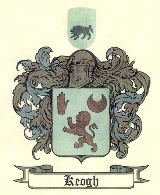
Site content © Bernard Keogh (2006) et al where noted.


 Home
Latest News
Conatct Details
Family History
My Working Life
My Sporting Life
World Travels
Special Events
Pictures
Home
Latest News
Conatct Details
Family History
My Working Life
My Sporting Life
World Travels
Special Events
Pictures
While we knew a little of our grandparents history we knew nothing of our great-grand parents - I was always of the mind that my grandfather was born in Ireland and all of my Dad's family history was over there - how wrong......... my grandfather was actually born in Grenfell Street in Widnes , the same street where I was born in 1945 - this little knowledge I have so far has been gleaned from the internet (Genes Reunited, Census Records and Births Marriages and Deaths Register) and the Widnes library Family History section. One thing is now apparent - there is a lot of work, time and effort to be spent in the future to piece together the past for the Keogh family - and then I'll need to start on the Evans family (Mums family) and the Mercer and Griffiths families (Irene's family).
So, the Keogh story so far............
Keogh Family
Keogh (Mac Eocaidh, Mac Keogh, Kehoe ) - I remember my Dad telling me
when I was young that our original family name was McKeogh..........he was right.
Keogh,
and its variant Kehoe, are the Anglicisation's of the Irish Mac hEochaidh, from eoch,
meaning "horse". It arose as a surname in three distinct areas. The first was in
south Roscommon, around Moyfinn in the barony of Athlone, which used to be known
as "Keogh's country". Keoghville in Taghmaconnell parish is named for them. This
family was part of the Uí Maine tribal grouping, and were a branch of the O'Kellys.
The second was in west Tipperary , near Limerick city; the placename Ballymackeogh
marks the centre of their territory. A branch of the family based at Castletroy in
Limerick spelled the name "K'eogh". The original homeland of the Mac Eocaidh family
was in the O'Byrne territory of North Kildare, and when, in the early 13th century,
the latter were driven into the less fertile lands of the present Co.Wicklow, the
MacKeogh's went with them
The third and most important, both numerically and historically, was in Leinster , where the original homeland was in north Kildare, whence they migrated first to Wicklow, and then south to Wexford. Here they were hereditary poets to the O'Byrnes, with whom, tradition has it, they shared their ancestry. The Leinster Keogh's were one of the great Irish bardic families and as such ranked high in the Ireland of former days. They furnished the great Kavanagh and O'Byrne clans with bards and brehons for over 5 centuries. The Leinster family takes it's descent from Cathair Mor, King of the province in the 4th century. The earliest reference to the bardic family of Mac Eocaidh is dated 1415, when it is recorded that the house of Dubhthach Mac Keogh, a learned poet, was plundered by Lord Talbot. The Four Masters state that Ferghal MacEocaidh (Farrell MacKeogh), a learned poet died in 1480.Their literary fame survived well into the modern period; Maolmuire MacKeogh is described in the Annals of the Four Masters as "chief professor of poetry in Leinster ". And it is recorded that Maolmuire Mac Keogh "the intended chief professor of poetry in Leinster, a man of learning and of extensive knowledge in poetry, and who kept a good house of hospitality, was accidentally killed by his mothers brethren, namely the sons of O'Toole".
A more recent practitioner was Padraig Kehoe of Enniscorthy (d.1959), prominent in the Gaelic Revival and in the War of Independence, who wrote prolifically under the pen-name "Hy Kinsella". It is in Wexford that the name has been most commonly anglicised Kehoe. It is in Leinster that the surname is now most frequent, though it has become widespread throughout Ireland .
William Keogh (1817-1878), of the Keoghville family, was an M.P. a founder of the Catholic Defence Association and a campaigner for tenants' rights. Later, on becoming a judge, his opinions shifted. The severity of his judgements in the trial of the Fenians in 1865 made him violently unpopular. Sir Alfred Keogh (1857-1936) was born in Dublin and became director-general of the British Army Medical Service before and during the First World War. Myles Keogh (1848-1876), from Carlow, had an intense and varied military career, fighting first with the Papal forces in Italy, then on the Union side in the American civil war, and finally with General Custer in the Indian wars. He died with Custer at the battle of the Little Big Horn. Myles Keogh's horse, Commanche, was the only survivor..........Ironic when you think the derivation of the name is Mac Eochaidh from the word "horse" and he was fighting against the Indians..................
